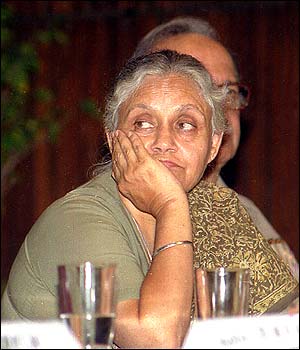 Amid the growing row between the government and governors, Rediff.com's Vicky Nanjappa recalls a landmark judgment by the Supreme Court that favours the latter.
Amid the growing row between the government and governors, Rediff.com's Vicky Nanjappa recalls a landmark judgment by the Supreme Court that favours the latter.
The government and governors are at loggerheads. The Modi sarkarhas made it clear that it wants at least 12 governors appointed by its predecessor, the United Progressive Alliance government, to go. So far only Uttar Pradesh governor B L Joshi has quit. Three others – J B Patnaik (Assam), H R Bhardwaj (Karnataka), and Sheila Dikshit (Kerala) -- have denied reports that they will resign.
As the tiff escalates, the ruling Bharatiya Janata Party may have to budge.
For a landmark verdict by the apex court in 2010 had ruled that governors cannot be removed just because there is a change of government at the Centre. The judgment, delivered by a constitutional bench headed by the then Chief Justice K G Balakrishnan, had laid down several guidelines on the issue.
The verdict stated that change of government is not a reason to change or remove a governor.
The governor cannot be removed on the ground that the government has lost confidence in him or that he or she is out of sync with the ideology of the new government. The only way is by 'withdrawing the President's pleasure'. Any order to this effect cannot be arbitrary or unreasonable, the bench had observed.
The court further observed that the power to withdraw the President's pleasure shall be exercised only in exceptional circumstances and reasons ought to be compelling in nature. It was made clear by the bench that the government cannot remove a governor as per its whims and fancies.
Firstly, the governor is not an employee of the Union government. Nor is he the agent of any political party.
A governor is a constitutional appointment and he needs to act in a fair manner and this is the reason why he is not under any government, the bench said in its order. A governor’s term lasts up to five years and he or she will remain in that post until the President’s pleasure is enjoyed.
The court, however, observed that the President could remove a governor without assigning any reason and also without giving opportunity. In such matters the courts would only have a limited power of review.
However, if a governor who has been removed feels aggrieved by such an order he could move the court and will need to prove that the order was illegal and arbitrary in nature.
In such matters, if the court is convinced that there is a case on hand, it would summon the Union government and ask it to disclose before the court on what grounds such a decision has been taken by the President of India. The government will have to make available the material on the basis of which the President had decided to take such a decision. If the government fails to provide such information, then the court will have to rule that the order was arbitrary, whimsical or mala fide. Such a case would be heard only if the court is convinced of these facts.
Image: Kerala Governor Sheila Dikshit










